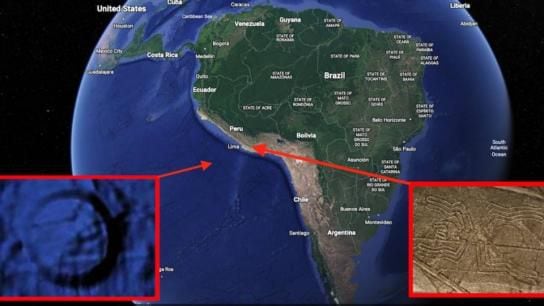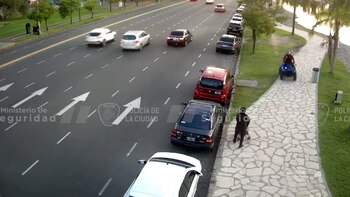
Extraterrestrials are mostly regarded as a legend, or beings that never made it to planet earth. This idea supported by researchers and studies still stands despite the discovery mentioned by researcher Scott Waring. He claims to have found evidence of ancient aliens at the bottom of the Pacific Ocean, this happened while he was examining the coast of Nazca, Peru, with the help of Google Earth.
According to La Vanguardia, he says he saw a UFO submerged while exploring the Pacific Ocean and thanks to Google's tool, he managed to find a dark circle that is located off the Peruvian coast. In this regard, he adds that the mysterious object is located at the bottom of the ocean and that there is a connection with the Nazca lines of Peru due to their proximity between the two elements.

WHAT IS THE CONNECTION TO THE NAZCA LINES?
According to the media, the Nazca Lines are a group of geoglyphs in the Nazca Desert, but they are so old that scientists differ on their origin: some believe that it was an attempt to connect with the gods in the sky, others claim that they were points of observation related to cosmology and astronomy.
Along these lines, Scott Waring says that the ancient culture of Nazca sought to connect with the gods and that is why they sought to contact the aliens.
“If you look closely at the 5-mile UFO, you will see a dome structure in its center that is taller than the rest of the disc. That's the classic disc design we've all heard of. This record at the bottom of the ocean is 100% proof of ancient aliens and technology is simply sitting on the bottom of the ocean,” he wrote in the description of a video posted to his official YouTube page on March 22.

However, so far no solid evidence has been found to suggest the veracity of the object's relationship with a UFO and responds to the hypothesis of the existence of extraterrestrials on planet Earth. Some point out that it is just any natural object found on the ocean floor, or is it the accumulation of toxic waste.
The truth is that according to the National Oceanic and Atmospheric Administration (NOAA), only 5% of the ocean floor has been mapped so far. On the other hand, the researcher continued to share articles on his hypothesis.
WHO IS SCOTT WARING?
Scott Waring is a researcher who, according to his Facebook profile, works at the ESL School Owner as a teacher, lives in Taipei and recognized for his theories or hypotheses about discoveries that could break the meaning of nature.
DISCUSSION ON COMMUNICATION WITH EXTRATERRESTRIALS
A few weeks ago, an article mentioned a debate among Harvard experts in linguistics and astrophysicists about whether humans could communicate with aliens or any alien race. The conversation sponsored by Harvard's Interfaculty Mind Brain Behavior Initiative and moderated by Edward J. Hall, Professor of Philosophy Norman E. Vuilleumier.
Using the American sci-fi drama film Arrival as a springboard, panelists Jesse Snedeker, professor of psychology and expert in language understanding, and Avi Loeb, astrophysicist and author of Extraterrestrial: The First Signs of Intelligent Life Beyond Earth (2021), examined the potential challenges we might face.
KEEP READING
Últimas Noticias
Debanhi Escobar: they secured the motel where she was found lifeless in a cistern
Members of the Specialized Prosecutor's Office in Nuevo León secured the Nueva Castilla Motel as part of the investigations into the case

The oldest person in the world died at the age of 119
Kane Tanaka lived in Japan. She was born six months earlier than George Orwell, the same year that the Wright brothers first flew, and Marie Curie became the first woman to win a Nobel Prize

Macabre find in CDMX: they left a body bagged and tied in a taxi
The body was left in the back seats of the car. It was covered with black bags and tied with industrial tape
The eagles of America will face Manchester City in a duel of legends. Here are the details
The top Mexican football champion will play a match with Pep Guardiola's squad in the Lone Star Cup

Why is it good to bring dogs out to know the world when they are puppies
A so-called protection against the spread of diseases threatens the integral development of dogs




